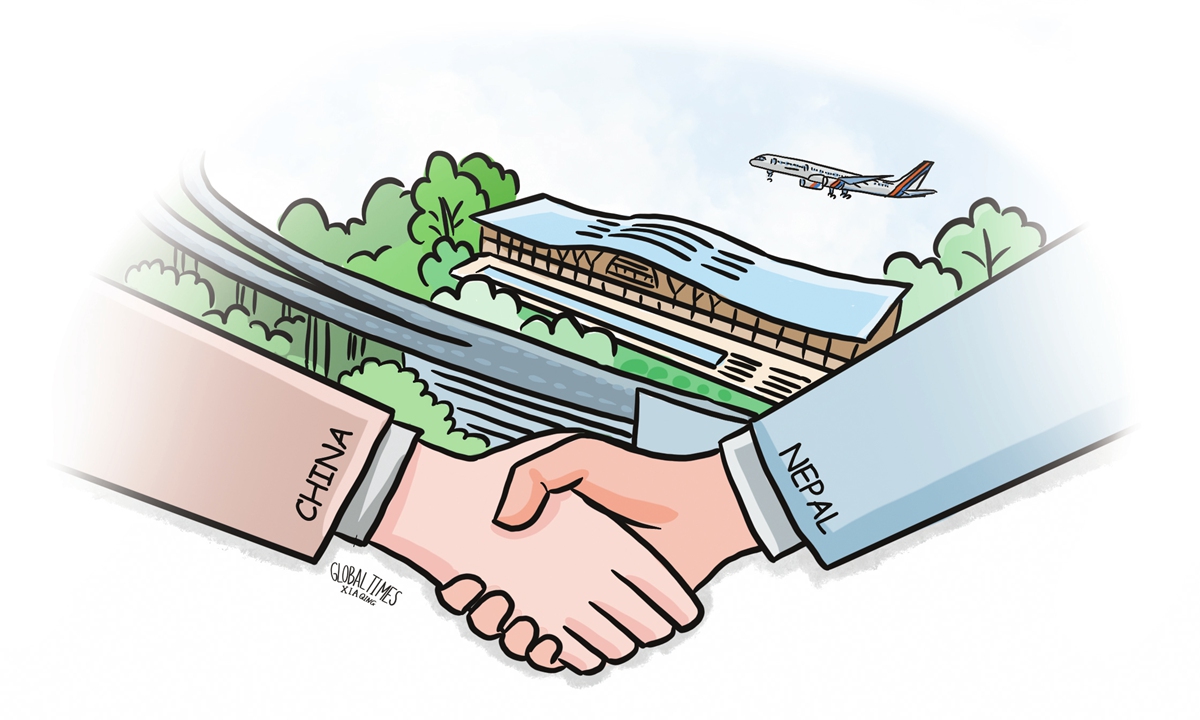(Source:Global Times,2024-12-05)

Illustration: Xia Qing/GT
China and Nepal have agreed to strengthen the synergy of their development strategies, and pursue deeper and even more concrete high-quality Belt and Road cooperation, according to a joint statement between the two countries issued during Nepali Prime Minister KP Sharma Oli's visit to China which concluded on Thursday.
The joint statement said that both sides agreed to ensure timely and swift implementation of the agreements signed, consensus reached, and decisions made as well as completion of the programs, projects and activities carried out jointly by the two countries.
According to the National Development and Reform Commission, China and Nepal also signed a framework agreement for advancing Belt and Road Initiative cooperation.
According to the framework agreement, the two sides will adhere to the principle of extensive consultation, joint contribution and shared benefits, strengthen practical cooperation in key areas such as economy, finance, transportation, logistics, trade, industrial investment and customs.
Both sides also expressed their commitment to strengthening connectivity between the two countries in such areas as ports, roads, railways, aviation, power grids and telecommunication, and to help Nepal transform from a land-locked country to a land-linked country, the joint statement reads.
Oli wrote on Wednesday on his X account that Nepal China economic cooperation will further strengthen under the Belt and Road Framework Cooperation.
The BRI framework cooperation agreement between China and Nepal has drawn scrutiny from Indian media outlets, casting the cooperation in a negative light.
The NDTV published a report on Wednesday titled Nepal joins China's Belt and Road Initiative, raises concerns for New Delhi.
The NDTV report questioned how the agreement between China and Nepal will be carried out, claiming it paves the way for China to fund these projects and how exactly each project would be financed by Beijing.
Times of India also attempted to sow discord, claiming that debt concerns have sparked debate within Nepal's coalition government. While the agreement may unlock new opportunities, the Nepali Congress Party, a key ally in Oli's coalition, opposes reliance on loans for these initiatives.
It's an old trick for Indian media to badmouth BRI cooperation of Nepal, smearing that the cooperation has not been yielding any practical results, but only dragging Nepal into a debt trap, Lin Minwang, a deputy director of the Center for South Asian Studies at Fudan University, told the Global Times.
It shows India's hegemonic attitude, Lin said, adding that some Indian media don't see Nepal as an independent sovereign country.
If India does not fundamentally change its mindset, it will be difficult for it to gain the respect of neighboring South Asian countries. New Delhi should not consider South Asia its sphere of influence, Lin added.
Lin said that South Asian countries need to develop, which should not be viewed through a geopolitical perspective. He also noted that India always hinders those South Asian countries' cooperative ties, but not able to offer alternatives. Other South Asian countries have developed sound relations with China as China advocates equal cooperation and mutual benefits, the expert said.
The joint statement also details various concrete cooperation projects that China will work on with Nepal.
The two sides agreed to jointly advance the fourth phase of the China-aided Araniko Highway maintenance project and the Hilsa-Simikot Road project, implement the second phase of the Kathmandu Ring Road Improvement Project, and welcome the signing of the Letters of Exchange for the Approval of the China-aid Project of Feasibility Study for the Tokha-Chhahare Tunnel.






